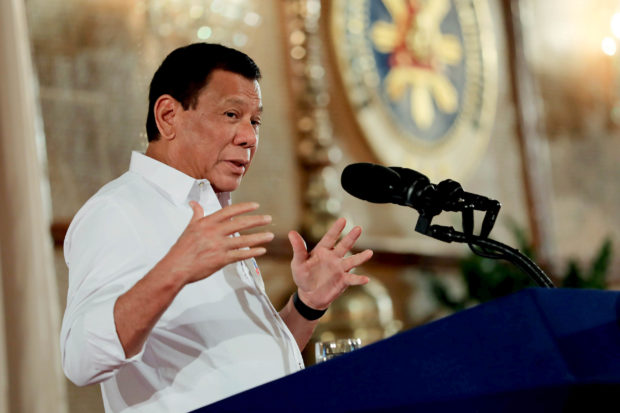Railway connecting Metro Manila to Bicol up for Duterte OK

President Rodrigo Duterte at Oath-Taking of Newly-Appointed Officials and various National Leagues. PRESIDENTIAL PHOTO
MANILA — The P285-billion south line of the North-South Railway Project (NSRP) that will connect Metro Manila and Bicol Region will be up for President Duterte’s approval this month, according to the state planning agency National Economic and Development Authority.
The NSRP’s south line, to be financed through official development assistance (ODA), “will revive the Philippine National Railways (PNR) south railway,” NEDA said in a statement on Wednesday.
Socioeconomic Planning Secretary and NEDA chief Ernesto M. Pernia earlier said the Japanese government would finance the NSRP’s south line.
According to NEDA, the NSRP’s south line will have three tracks: a 72-kilometer commuter line from Tutuban in Manila to Los Baños in Laguna; a 581-kilometer long-haul line from Los Baños to Sorsogon; and a connecting third track terminating at the Port of Manila via the FTI complex in Taguig City.
The NSRP’s south line was one of the three railway projects approved by the interagency NEDA-Investment Coordination Committee (ICC) during the joint technical board and Cabinet Committee meeting last June 1.
Article continues after this advertisementLast week, Pernia said the NSRP’s south line, the 102.28-kilometer Mindanao Railway Project’s Tagum-Davao-Digos segment (to cost P35.26 billion), and the P211.43-billion Malolos-Clark Railway Project were tentatively scheduled to be pitched to President Duterte, the NEDA Board chairman, for his approval on June 26.
Article continues after this advertisementThe first phase of the Mindanao Railway Project running through the Davao provinces will be financed under the national budget, while the Malolos-Clark Railway Project will also be funded by Japan.
Also, NEDA said the ICC during last week’s meeting “approved a two-year extension of the OPEC Fund for International Development loan for the Road Improvement and Institutional Development Project of the Department of Public Works and Highways, as well as noted updates provided on the ongoing review of various roads and bridges, public transport, irrigation, and flood control projects.” SFM